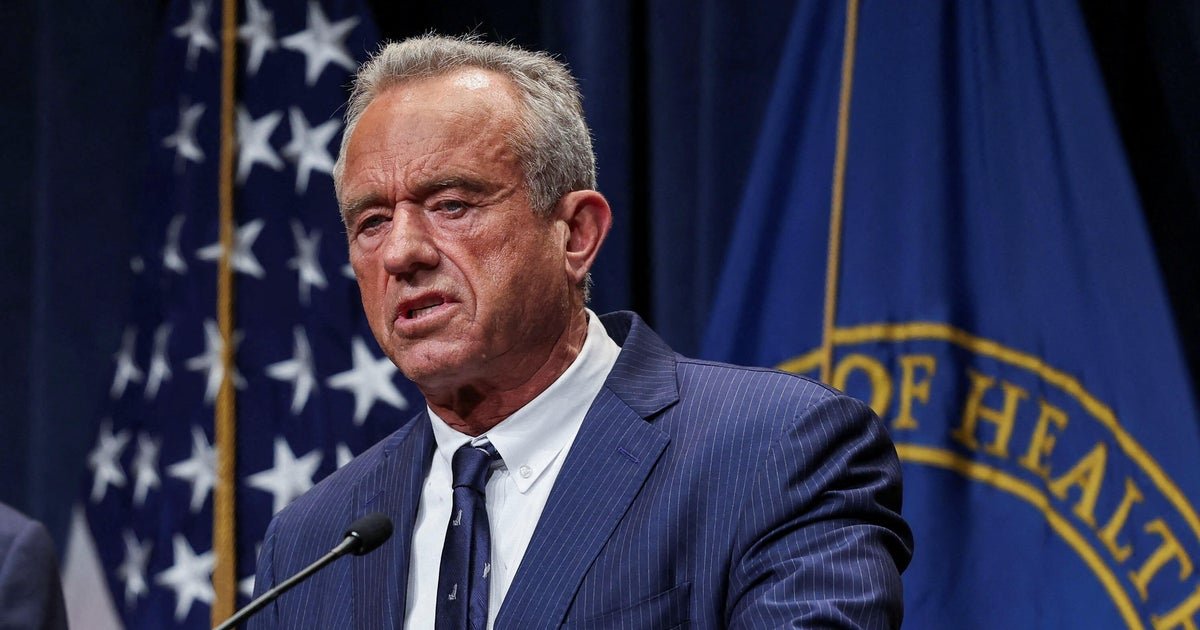Johannesburg — Every four years, representatives to the global alliance of governments, pharmaceutical makers, United Nations agencies and philanthropic organizations known as Gavi, which helps get vaccines to people who need them, meet to lock in new funding pledges. Just as this year’s meeting in Brussels was drawing to a close on Wednesday, U.S. Health Secretary Robert F. Kennedy Jr. announced that all funding from Washington would cease.
In a three-and-a-half-minute video message that Kennedy shared on social media, he said the Trump administration was halting funding to the organization because it had “neglected the key issue of vaccine safety.”
Kennedy, who has sought to distance himself from the “anti-vaccine” label, has a history of making misleading statements about vaccine safety and has been tied to anti-vaccine activism groups.
Gavi says it has helped vaccinate more than 1.1 billion children in 78 low income countries and prevented more than 18.8 million deaths since its creation 25 years ago. Its focus is getting vaccines, especially new vaccines, to populations that would struggle to afford them or access them otherwise.
Kennedy argued in the video that GAVI “has neglected the key issue of vaccine safety,” and that “when vaccine safety issues have come before Gavi, Gavi has treated them not as a patient health problem, but as a public relations problem.”
Kevin Mohatt/REUTERS
Kennedy accused GAVI of ignoring the science and said the alliance must “justify the $8 billion the U.S. has given it since 2001.”
The U.S. has long been among the top government contributors to Gavi’s funding, which also comes from private organizations.
The Biden administration had committed to $1.6 billion in funding for the organization from 2026 through 2030 — an amount roughly equal to the funding pledged by the private Gates Foundation — and shock and outrage reverberated across the conference in Brussels after Kennedy’s announcement.
Bill Gates, co-founder of Microsoft and the Gates Foundation, said on social media that the move would have “devastating consequences.” He called on the U.S. Congress to keep funding Gavi, warning that if it did not, “more sick kids will fall behind in school,” and there would be “more overcrowded hospital wards and eventually more grieving parents.”
“If Congress allows this to happen, the consequences will be devastating,” Gates Foundation CEO Mark Suzman said. “Hundreds of thousands, if not millions, of preventable deaths will occur, especially among mothers and children.”
Dr. Atul Gawande, a public health researcher and surgeon at the Brigham and Women’s Hospital in Boston who previously held a seat on the Gavi board, said Kennedy would be held personally responsible for the results of halted U.S. government funding, which he called a “travesty and a nightmare.”
“I would expect to see significant changes and reductions in access to safe and effective vaccines to children, in the poorest and most vulnerable countries of the world,” one U.S. official with decades of experience in global health and vaccination programs told CBS News on the condition of anonymity. “Kennedy’s rhetoric on vaccine safety is not helpful and is likely to fuel vaccine hesitancy in the minds of people across the world, where we will surely now see more uncontrolled outbreaks of vaccine-preventable diseases. This is very unfortunate.”
The U.N.’s World Health Organization has warned since 2019 that vaccine hesitancy and mistrust is one of the leading threats to global public health.
The goal of this year’s conference was to secure funding to reach the organization’s target of over 90% global coverage with essential vaccines for a wide range of diseases such as diphtheria, tetanus and measles. Gavi received more than $9 billion in funding commitments on Wednesday, but it had hoped to garner $11.9 billion for the next five years, with the goal of immunizing 500 million children globally.
Other countries acknowledged Gavi’s importance, and increased their contributions at the conference on Wednesday.
Topping that list was the U.K.
British Foreign Secretary David Lammy announced $1.7 billion for the coming five years, making the U.K. Gavi’s new largest donor.
Ghana’s President John Darami Mahama, addressing the Gavi conference on Wednesday, began by detailing his younger brother’s struggle with polio, and the stigma associated with the disease, which has been virtually eradicated worldwide thanks to vaccination programs launched in the late 1980s.
“I understand the importance of vaccines,” Mahama told the delegations.
When his brother was diagnosed, vaccine access in Ghana was close to zero, but the president said that, through partnership with Gavi, 97% of the population was now vaccinated.
He said officials were still working to reach the last 3% — about “65,000 children who are in remote areas, difficult to reach for life saving vaccines” — and that Ghana planned to no longer need Gavi’s support by 2030.
Mahama concluded his remarks with a topical comparison, saying: “One B-2 Spirit Bomber that dropped bombs on Iran cost $2.13 billion,” and that he had done the math, adding: “Surely the world can afford the value of four B-2 bombers to save 500 million children. It’s a choice we have to make.”
